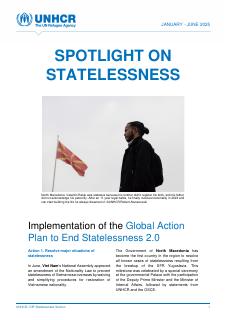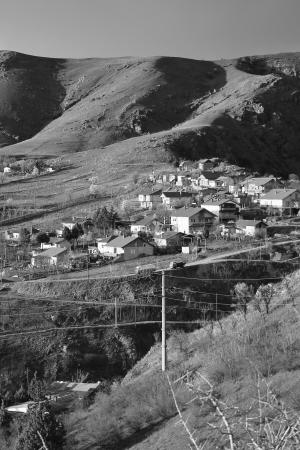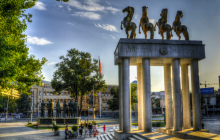“I was born right here where I live but I have no citizenship and, without it, life is not easy. When I need to go to a doctor, for example, I can’t. I don’t know where to turn for help”.
Altin, North Macedonia
KEY ISSUES
- Statelessness and the risk of statelessness mainly affects members of the Roma community in North Macedonia, who were disproportionality impacted by difficulties acquiring or establishing nationality in the context of the fall of the Yugoslavian republic in the 1990s.
- Several hundred people are reported to be affected by (risk of) statelessness in Montenegro, but this is likely to be an underrepresentation of the scale of the issue.
- Historically, there were significant barriers to birth registration and resolving unregulated civil status in North Macedonia, which also affected the ability of members of minority communities to establish citizenship.
- In recent years, North Macedonia has adopted a number of measures to improve access to personal documentation, reduce statelessness, and prevent further cases arising.
- Safeguards to prevent statelessness among children born in the country focus on the legal status of the parent, rather than the child, and so are not fully in line with international law. The residence requirement for naturalisation is reduced for stateless people.
- North Macedonia is a party to both Statelessness Conventions, but has no statelessness determination or protection system in place.
STATELESSNESS IN NORTH MACEDONIA
Statelessness and the risk of statelessness in North Macedonia particularly affects members of the Roma community. The dissolution of the former Socialist Federal Republic of Yugoslavia and the subsequent changes to citizenship laws, destruction of civil registers and conflict-induced displacement in the 1990s, disproportionately impacted minority groups. Viewed as outsiders, they faced discrimination and exclusion in the newly established territories. Barriers to civil registration, including the inability to meet documentary evidence requirements, poverty, lack of awareness and discriminatory attitudes of some registry officials, perpetuate the prevalence of statelessness, especially among the Roma.
North Macedonia is a party to both Statelessness Conventions and has introduced a definition of a stateless person in domestic legislation that is in line with international law. However, it does not have a statelessness determination procedure nor a stateless protection status in place. It also lacks comprehensive, official data and statistics on the number of stateless persons in its territory. At the end of 2023, UNHCR reported 275 stateless people in North Macedonia, down from 453 at the end of 2022, remarking in a footnote that “the great majority are former Yugoslav citizens who have yet to have their nationality of North Macedonia formally recognized through the issuance of documents proving nationality”. The country’s latest census, conducted in 2021, included a distinct category of stateless people and recorded 584 stateless people – down from 17,652 people ‘without citizenship’ in the previous census carried out in 2002. However, there are concerns about the methodology used for the latest census, as there are inconsistencies between the data reported in the census, the number of people identified as unregistered during a public call by the government in 2018 for the registration of undocumented people, and data held by civil society in some municipalities. Therefore, the number of stateless people is likely to be higher than the number recorded in the census.
In North Macedonia, access to healthcare for stateless people is contingent on being married to a Macedonian citizen or possessing a valid foreigners’ residence permit. Stateless children and children lacking birth registration face obstacles attending school and being issued school certificates. Stateless people usually do not have access to employment and work in the informal economy.
North Macedonia has adopted significant measures to address the lack of identity documents and birth registration of those with unregulated civil status. In 2023, in response to joint advocacy efforts from international and national stakeholders, Parliament adopted amendments to the Law on Civil Registry. The amendments aim to regularise the situation of the people without personal documentation (the majority of whom are Roma), including those identified by the 2018 Government-led public call, through a simplified and facilitated procedure for birth registration. The Law on Civil Registry now also mandates the immediate registration of every child born within the territory of North Macedonia, within 45 days after birth, irrespective of the nationality or legal status of the child’s parents. In 2023, Parliament also adopted amendments to the Law on Registration of Residence and the Law on Identification Documents, enabling homeless people and people accommodated in social institutions to register their residence at the address of social work centres through a simplified procedure. People living in “non-legalised houses” are also offered pathways to document property ownership and obtain identity documentation. These amendments enable formerly stateless people who have acquired Macedonian nationality and live in “non-legalised houses”, informal settlements or in destitution to register their residence and obtain a Macedonian identity card.
THE RIGHT TO NATIONALITY IN NORTH MACEDODIA
Nationality is regulated in the Law on Citizenship of the Republic of North Macedonia – first adopted in 1992, following the country’s independence, and subsequently amended on a number of occasions, most significantly in 2004. Access to nationality at birth is based primarily on the principle of jus sanguinis (by descent). There is only a partial safeguard in nationality law to prevent children being born stateless in North Macedonia (Article 6(1)), which is not in line with the 1961 Convention – despite North Macedonia being a state party to this instrument. A child born on the territory to stateless or unknown parents acquires North Macedonian citizenship, but the provision focuses on the status of the parents rather than the statelessness of the child, so it does not cover children born to parents who have a nationality but cannot confer it to their child. Due to the lack of a statelessness determination procedure in North Macedonia, proving the statelessness of the parents can be very challenging. In addition, there is no framework for identifying when a child would otherwise be stateless at or after birth registration. The same provision in the law does also provide for access to nationality for foundlings. Nationality can only be withdrawn if the parents are later identified and can confer their nationality to the child, and this would not leave the child stateless.
Naturalisation in North Macedonia generally requires a period of at least 8 years of continuous, lawful residence. For stateless people, there is a facilitated process under Article 7A of the Law on Citizenship: access to naturalisation is accelerated and available after the shorter period of 6 years’ residence. However, the law does not exempt stateless people from meeting the other conditions for naturalisation, which include including submitting birth registration documentation. The Law on Citizenship of North Macedonia does not provide for the possibility of involuntary loss or deprivation of nationality.
In 2019, the Government introduced a regularisation route under the ‘Law on Foreigners’. This allows former citizens of Yugoslavia who continued to live in North Macedonia after 8 September 1991 without acquiring any nationality (and their children under five) to apply for permanent residence, if they registered within three years of the adoption of the law. Previously, burdensome documentary and administrative requirements had resulted in breaks in legal stay in North Macedonia which, in turn, affected access to naturalisation. In August 2021, amendments to the Law on Citizenship were introduced providing additional possibilities for nationals of the former Yugoslavia to obtain Macedonian citizenship in a shorter procedure and with exemptions from certain conditions that are mandatory for other foreigners. This route sits alongside the already existing facilitated naturalisation for stateless people and recognised refugees and will be in force until August 2024.
NORTH MACEDONIA’S INTERNATIONAL COMMITMENTS
North Macedonia has been a state party to the 1954 Convention Relating to the Status of Stateless Persons since 1994 and acceded to the 1961 Convention on the Reduction of Statelessness in 2020 (implementing a voluntary pledge made at the 2019 UNHCR High Level Segment on Statelessness). It maintains no reservations to the Convention provisions. North Macedonia has acceded to the ICCPR, ICESCR, CRC, CERD, CEDAW, CAT and CRPD, for which it maintains no reservations against the provisions relating to nationality. For more information on regional standards and intergovernmental commitments in Europe, see the StatelessHub Europe page.
- Click here to see what Recommendations North Macedonia has received through the Universal Periodic Review
- Click here to see what Recommendations North Macedonia has issued through the Universal Periodic Review
- Click here to see what voluntary pledges have been made by North Macedonia.
[Last updated, December 2023]
Cover photo by Shalev Cohen
Further reading
VOICES & EXPERIENCES
-
Discrimination against Roma in accessing birth registration in North Macedonia
![North Macedonia]()
Discrimination against Roma in accessing birth registration in North Macedonia
![North Macedonia]()
“Four [of my] children don’t have birth certificates because I didn’t have money to even survive when they were born… I knew that I have to register them. They were born at home. I started a procedure for late registration, and for the past 10 years I can’t register them. I was required to provide many documents. They asked for DNA analysis which is expensive and we could not pay for it…The problem was mostly due to the fact that we didn’t have money to pay for the analysis.”
Affected person
Voice from https://www.institutesi.org/resources/roma-belong-western-balkans-and-ukraine
(page 31)
-
Disproportionate Impact on the Stateless Roma Community during COVID-19 in North Macedonia
![North Macedonia]()
Disproportionate Impact on the Stateless Roma Community during COVID-19 in North Macedonia
![North Macedonia]()
“The Roma community, NGOs and the authorities need to collaborate to raise awareness, identify needs, and provide direct assistance to the Roma people. In the long run, greater effort is needed to ensure that Roma people are included in society and have equal access to basic needs, improving infrastructure, access to healthcare, housing, employment, and education. The vulnerabilities and needs of the Roma should be considered by the EU, the European Parliament, donors, and all other stakeholders to ensure this community Is able to cope with the effect of COVID-19.”
Remzi Medik
President of Bairska Svetlina
Voice from https://files.institutesi.org/NORTH_MACEDONIA_Together_We_Can.pdf
-
Yugoslavia’s Dissolution Continues to Cause Statelessness in North Macedonia
![North Macedonia]()
Yugoslavia’s Dissolution Continues to Cause Statelessness in North Macedonia
![North Macedonia]()
“I was born right here where I live but I have no citizenship and, without it, life is not easy. When I need to go to a doctor, for example, I can’t. I don’t know where to turn for help”
Altin, Affected person
In 2019, the North Macedonian Government introduced a regularisation route under the ‘Law on Foreigners’, which allowed former citizens of Yugoslavia who continued to live in North Macedonia after 8 September 1991 without acquiring any nationality (and their children under five) to apply for permanent residence if they register their stay within three years of the adoption of the law. However, the law is timebound and only provides a solution for those who can meet the criteria.
Voice from https://balkaninsight.com/2021/04/28/north-macedonias-stateless-spy-end-to-struggle-for-citizenship/
Latest Resources: North Macedonia
-

Spotlight on Statelessness January-June 2025
Type of Resource: Report
Theme: General / Other
Region: Global / Other
View -

Key Considerations For The Prevention And Reduction Of Statelessness Among Roma In The Western Balkans: Regional Challenges And Action Areas
Type of Resource: Briefing / Policy paper
Theme: General / Other
Region: Europe
View -

Ending Statelessness in South Eastern Europe #IBelong
Type of Resource: Report
Theme: General / Other
Region: Europe
View



